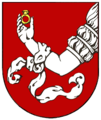Fürstenberg/Havel
Fürstenberg | |
|---|---|
 Church in Blumenow | |
Location of Fürstenberg within Oberhavel district  | |
| Coordinates: 53°11′07″N 13°08′44″E / 53.18528°N 13.14556°E | |
| Country | Germany |
| State | Brandenburg |
| District | Oberhavel |
| Subdivisions | 10 districts |
| Government | |
| • Mayor (2019–27) | Robert Philipp[1] (Ind.) |
| Area | |
• Total | 212.61 km2 (82.09 sq mi) |
| Elevation | 53 m (174 ft) |
| Population (2022-12-31)[2] | |
• Total | 5,816 |
| • Density | 27/km2 (71/sq mi) |
| Time zone | UTC+01:00 (CET) |
| • Summer (DST) | UTC+02:00 (CEST) |
| Postal codes | 16798 |
| Dialling codes | 033093 |
| Vehicle registration | OHV |
| Website | www.fuerstenberg-havel.de |
Fürstenberg (German pronunciation: [ˈfʏʁstn̩ˌbɛʁk] ) is a town in the Oberhavel district, Brandenburg, Germany.
Geography
[edit]
Fürstenberg is situated on the River Havel, 21 kilometres (13 mi) south of Neustrelitz, and 75 kilometres (47 mi) north of Berlin.
The city lies at the southern edge of the Mecklenburg Lake District and is framed by the Röblinsee, Baalensee, and Schwedtsee lakes. The River Havel splits into several channels as it flows through the town, one of which contains a lock used by vessels navigating the river. The original town site was situated on an island between these channels.
Districts of Fürstenberg
[edit]Fürstenberg includes nine areas, named for former villages that are now mostly farmland or little more than a church:
- Altthymen
- Barsdorf
- Blumenow
- Bredereiche
- Himmelpfort
- Steinförde
- Ravensbrück
- Tornow
- Zootzen
Fürstenberg Palace
[edit]
North from the center of the city is Fürstenberg Palace, which was built between 1741 and 1752 by the architect Christoph Julius Löwe for Dorothea Sophie of Mecklenburg-Strelitz, the wife of Adolphus Frederick III, the Duke of Mecklenburg-Strelitz. In World War I and World War II, the palace was used as a hospital.
History
[edit]In 1701, Fürstenberg became a part of the Duchy of Mecklenburg-Strelitz, which in 1815 became the Grand Duchy of Mecklenburg-Strelitz and in 1918 the Free State of Mecklenburg-Strelitz. From 1933 to 1945, Fürstenberg was part of Mecklenburg and from 1945 to 1952 of Mecklenburg-Vorpommern. From 1952 to 1990, the town was part of the East German Bezirk Potsdam. Since German reunification in 1990, it is part of Brandenburg.
In 1758, the Battle of Tornow was fought near the town between the forces of Prussia and Sweden during the Seven Years' War.
In the Nazi era, Fürstenberg was the site of Ravensbrück concentration camp. A memorial has been raised on the site.
Overrun by the Soviet Army in 1945, post-World War II they established the base of the 2nd Guards Tank Army of the Soviet Forces in Germany. In early 1959, three years before the Cuban Missile Crisis, the site was equipped with six R-5 Pobeda nuclear missiles, capable of launching from a mobile launcher from one of four tennis-court-sized sites capable of handling the larger R-12 Dvina.[3] Similar sites were set up at Vogelsang, Zehdenick and Lychen (1xpad).[4] After the withdrawal of the missiles in September 1959, the site returned to its original purpose as an army base.
Since the formation of the states (German Länder) in the GDR in 1990, Fürstenberg again belonged to the state of Brandenburg, and from 1993 became part of the newly formed district of Oberhavel. The Russian Army troops were withdrawn from their former East German bases in 1994.
Demography
[edit]-
Development of Population since 1875 within the Current Boundaries (Blue Line: Population; Dotted Line: Comparison to Population Development of Brandenburg state)
-
Recent Population Development (Blue Line) and Forecasts
|
|
|
Transportation
[edit]The town lies on the Berlin-Stralsund railway. The railway station is called Fürstenberg (Havel) and is serviced by DB Regio Nordost. The web site or vending machines of Verkehrsverbund Berlin-Brandenburg can be used to buy tickets.
Federal highway Bundesstraße 96 passes through town.
Notable residents
[edit]
- Martin Blumner (1827-1901), composer, conductor and musical theorist
- Walter Bartel (1904-1992), resistance fighter and historian
- Elsa Ehrich (1914–1948), Nazi SS concentration camp guard executed for war crimes
- Daniel Domscheit-Berg (1978–), technology activist.
Connected to Fürstenberg
[edit]- Heinrich Schliemann (1822-1890), archaeologist, 1836-1841 Apprentice in Fürstenberg
- Otto Hammann (1852-1928), lawyer and journalist, died in Fürstenberg
- Oskar Minkowski (1858-1931), physician, died in Fürstenberg
- Semyon Konstantinovich Kurkotkin (1917-1990), Marshal of the Soviet Union, commander of the 2. Armored Army in Fürstenberg
- Daniel Domscheit-Berg (born 1978), former speaker of the Unveiling Platform WikiLeaks, lives in Fürstenberg
References
[edit]- ^ Landkreis Oberhavel Wahl der Bürgermeisterin / des Bürgermeisters, accessed 2 July 2021.
- ^ "Bevölkerungsentwicklung und Bevölkerungsstandim Land Brandenburg Dezember 2022" (PDF). Amt für Statistik Berlin-Brandenburg (in German). June 2023.
- ^ "Fürstenberg Soviet Nuclear Missile Base, Nuclear Storage Bunkers".
- ^ "Vogelsang Soviet Nuclear Missile Launch Pads".
- ^ Detailed data sources are to be found in the Wikimedia Commons.Population Projection Brandenburg at Wikimedia Commons
Gallery
[edit]-
Former brewery in Himmelpfort
-
Church in Tornow
-
Castle in Tornow
External links
[edit] Media related to Fürstenberg/Havel at Wikimedia Commons
- Official site (in German)








